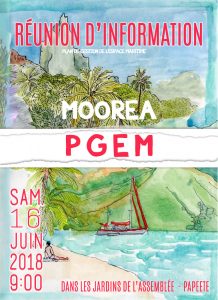The meeting of 16 June showed that the Polynesian sailing community existed and knew how to mobilize in Tahiti. Congratulations again and thank you all for your presence.

The minutes of the meeting can be made here. We have delayed its publication in agreement with the Moorea authorities.
Meeting minutes
Date:
16/06/2018, 9:15 a.m. - 11:00 a.m. at the Round of the Assembly of Polynesia
Participants:
Moorea representatives: Heiriti ARAPARI (in charge of the PGEM in Moorea), Franck TAPUTUARAI (assistant association), Charly AMARU (nautical brigade mediator)
AVP Office: Arnaud Jordan, François Rigaud, Sophie Deriols, Régine Rehel, Bernard Guillou
Assistance: about 60/65 people
Media: TNTV, ...
OdJ:
Introducing Moorea's future PGEM; question-and-answer
Summary report
(in red: requests for assistance)
The presentation is made, for the most part, by Heiriti:
1 - General on the PGEM, as well as on the former (current) PGEM of 2004
13 years of operation:
-
- problem of the absence of sanctions (distribution of powers ...): no minutes have been established in 13 years, and therefore no sanctions for non-compliance ...
- complexity of procedures
- no follow-up indicators
- no long-term vision
- no specific financial and human resources
- population growth: in particular urbanization and artificialization of the coastline
- …
2018 MGEM Goals:
-
- increase its efficiency
- …
2 - History of the current process:
-
- 2014: establishing the roadmap, with the participation of many stakeholders
- 2015: Launch of the review
-
- 2016: Local Commission (CLEM): drafting of the PGEM revisions; participation of 3 representatives of "nautical activities"
-
- First semester: information from the local population
-
- 2017: negotiations/synthesis (compromise on non-consensus points)
- Finalization by obtaining positive opinion from the Planning Commission
3 - Goals of the new PGEM:
-
- - access to the sea for all
- - sustainable water activities
- - better distribute responsibilities/skills among the various authorities (Country, Municipalities, Police/Gendarmerie, etc.)
- - change in the composition of the Standing Committee (increase in the number of members, including 5 members of nautical activities)note: these 5 members would already be appointed, without the AVP having been consulted
- - setting up an official manager (which would be the municipality of Moorea)
- - zoning (BY the local population and FOR the population)
- - publication of 4 regulatory maps: fishing-related activities, protected areas, nautical activities, ...
- - 21 access to the sea (and land ...), 27 dive sites, 3 areas for ocean liners, 2 long-term moorings, 7 short-term moorings, etc.
- The quota of boats would be a request from the Minister of Tourism, not the municipality of Moorea; possible derogations for "events"; it is the Standing Committee that will define the quotas and durations of attendance.
- 4 - Various points:- Wetting: banned everywhere in principle at night (except long-term areas and marinas)- Organized moorings: possible onshore services; royalties; annual quotas, which may change; but how to manage (how to know if a mooring is "full" before going), and by whom (the sailboats themselves)? Presentation of a table of moorings/quotas, which would suggest that only 40 boats could be present in Moorea at night- Public inquiry to come: duration 2 months; unlikely on the internet; and very unlikely the WE- Marina de Vaiare: compliance before any extension
- Comment: Black water treatment plant envisaged in Vaiare (south-east of Moorea) not logically and economically compatible with most of the anchorages to the north
5 - Future:
-
- July August 2018: adoption of the revised EMPP (following the favourable opinion of the Planning Commission) in the City Council
-
- September October 2018: public inquiry
-
- November 2018: Commissioner-Investigator's summary report
-
- …. CLEM 6: Revised PGEM
-
- …. Council of Ministers for validation (ministerial decree)
6 - Miscellaneous questions
-
- - proposal for seasonal quotas (international transumance, large WE, etc.); buoys would be reserved for charters... ; Are there reliable statistics on the actual occupancy of moorings over time (because the "saturation" of some moorings seems to be limited to a few specific times of the year)? Debates on the different quotas proposed by implementations.
- - Difficult access to land; secure access request (pontoons) with minimum services (water, garbage cans, ...)
- - Comment: economic non-viability of a possible private boating service provider on each mooring area if the number of boats is too low ...
- - Comments: a higher quota of boats does not mean increased pollution at the same time; similarly, an increased quota of boats does not mean a parallel reduction of other water activities ...
- - Request: setting up a quota timetable; Online;
- - Request: possibility of delegation of services to a private company?
- - Request: complexity of access to PGEM texts and map
- - The buoys would be, for their maintenance, the responsibility of the Country ...
- - Comments: responsibilities in case of mooring failure (compulsory) (and paying)?
- - Comment: low availability of relief in Moorea
- - Comment: tender for the maintenance of buoys; money exists (Europe, High Commission, Ministry of Tourism, ...), you only have to bother to build a grant file ...
Bernard GUILLOU
Assistant Secretary





